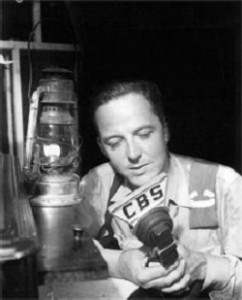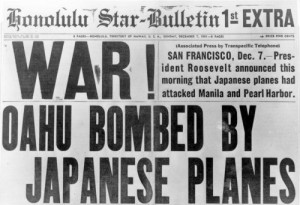I’ve been reading Steven M. Gillon’s Pearl Harbor: FDR Leads the Nation into War, an exceptionally fine monograph about what happened during the twenty-four hours that followed the Japanese attack on Pearl Harbor. One of the parts that I found most fascinating was Gillon’s description of how and when the American public found out about what happened in Hawaii.
 The first wire-service bulletin, “Washington—White House announces Japanese have attacked Pearl Harbor,” was transmitted by United Press International at 2:25 p.m. on December 7, 1941, half an hour after President Roosevelt got the news at the White House. NBC broadcast it four minutes later, and CBS followed suit at 2:31. But it seems to have taken longer—infinitely longer, by postmodern standards—for the average American to learn about Pearl Harbor. Not for another two and a half hours did major newspapers publish “extra” editions reporting the attack, and it took even longer for those editions to reach the street.
The first wire-service bulletin, “Washington—White House announces Japanese have attacked Pearl Harbor,” was transmitted by United Press International at 2:25 p.m. on December 7, 1941, half an hour after President Roosevelt got the news at the White House. NBC broadcast it four minutes later, and CBS followed suit at 2:31. But it seems to have taken longer—infinitely longer, by postmodern standards—for the average American to learn about Pearl Harbor. Not for another two and a half hours did major newspapers publish “extra” editions reporting the attack, and it took even longer for those editions to reach the street.
According to Gillon:
Only a small number of Americans were listening to the radio when the first Pearl Harbor announcements were made. In the 1940s, it was typical for middle-class Americans to eat dinner around 1:00 p.m. on Sundays. Many families living in the East and Midwest were gathered around the dinner table or relaxing after a big meal. Most of the nation was also experiencing nice weather on December 7. More people than usual were outside, going for afternoon drives in the country, walking in the park, attending football games, or catching a matinee at the local movie theater….
A reporter for the Kansas City Times reported that the city maintained “a business-as-usual calm” in the hours after the story broke. The main reason, he speculated, was that most people did not learn of the attack until the newspaper boys started shouting the headline on Sunday evening as they pushed late editions on street corners.
When President Kennedy was assassinated in 1963, by contrast, pollsters later reported that “92% of the [American] public knew what had happened within two hours of the shooting.” I was seven years old, and my elementary school dismissed all classes immediately after his death was reported. The family TV set (we only had one) was on when I got home, and it stayed on for most of the rest of the weekend.
 Today breaking news spreads even faster via a much larger number of “channels,” Twitter prominent among them. Hence we take it for granted that when something important happens in the world, we’ll know about it right away, one way or another. But America moved more slowly in 1941, partly because the technology to speed it up did not yet exist and partly—maybe mostly—because ordinary Americans seem to have felt that nothing in the world, not even a surprise attack on Pearl Harbor, was so important that it couldn’t wait.
Today breaking news spreads even faster via a much larger number of “channels,” Twitter prominent among them. Hence we take it for granted that when something important happens in the world, we’ll know about it right away, one way or another. But America moved more slowly in 1941, partly because the technology to speed it up did not yet exist and partly—maybe mostly—because ordinary Americans seem to have felt that nothing in the world, not even a surprise attack on Pearl Harbor, was so important that it couldn’t wait.
Back then, of course, the world really was bigger, immeasurably so. Our collective anxiety over the spread of Ebola is not an artifact of round-the-clock coverage by the cable news networks but a function of our collective awareness that an outbreak of disease in Africa can reach any part of the United States via the next transcontinental flight. Even so, the intensity of that anxiety has been fed by the ubiquity of web-based news—or, rather, “news,” since what we hear on Twitter may or may not be true.
Like everyone else who has lived on both sides of the information-technology chasm, I have mixed feelings about the wired world into which I have survived. Most of the time I happily side with its strengths, but there was also much to be said for a culture in which we were not required to live in a continuous now. On December 7, 1941, the American people had a fair amount of time to get used to the idea of being at war. They went to church that morning, came home and ate their Sunday dinners, took a peaceful afternoon nap, then turned on the radio to listen to The Jack Benny Program. They heard it, too, though Benny’s regular broadcast was interrupted twice for war-related news bulletins. It wasn’t until the following afternoon that FDR’s voice was finally heard on the radio, when he went before a joint session of Congress to ask for a declaration of war on Japan.
By then America was reasonably ready to grapple with the new reality that lay dead ahead. Nowadays, by contrast, we’re expected to grapple with new realities mere minutes after they happen. Small wonder that our responses to them are becoming increasingly reflexive and superficial. The world expects too much of us, and we are, I suspect, doomed to disappoint.
* * *
Listen to NBC’s first Pearl Harbor bulletin here.
Listen to the December 7 episode of The World Today, CBS’ regular Sunday-afternoon news broadcast, here.
Listen to the December 7 episode of The Jack Benny Program here.
FDR addresses a joint session of Congress on December 8:
The first hour of CBS’ coverage of the assassination of President Kennedy on November 22, 1963:
